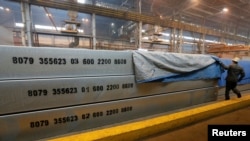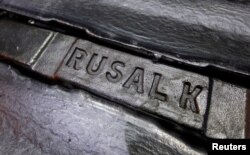Russian aluminum giant Rusal is stockpiling large quantities of aluminum at one of its plants in Siberia because U.S. sanctions imposed this month have prevented it from selling the metal to customers, five sources close to the company said.
With the firm's own storage space filling up with unsold aluminum, Rusal executives in Sayanogorsk, in southern Siberia, have had to rent out additional space to accommodate the surplus stock, one of the sources told Reuters.
"Aluminum sales have broken down. And now the surplus aluminum is being warehoused in production areas of the factory itself," said someone who works on the grounds of one of Rusal's two plants in Sayanogorsk.
Several people connected to Rusal said that Oleg Deripaska, the company's main shareholder who along with the company was included on a U.S. sanctions blacklist, visited Sayanogorsk this week for a closed-door meeting with staff.
Asked if the firm was stockpiling aluminum in Sayanogorsk, a Rusal spokeswoman declined to comment.
Rusal and Deripaska were included on a U.S. sanctions blacklist this month, scaring off many of its customers, suppliers and creditors who fear they too could be hit by sanctions through association with the company.
A number of traders and customers of Rusal's aluminum have stopped buying the firm's products, citing the sanctions risk, and Rusal has stopped shipping some of its products for export, according to a logistics firm and a railway operator that used to carry much of its aluminum.
While shipments have stalled, Rusal cannot readily reduce its production of aluminum because the electrolysis pots that are at the heart of the manufacturing process can be irreparably damaged if they are shut down.
At Rusal's two plants in Sayanogorsk — which together accounted last year for about a quarter of the firm's production — aluminum is now stacking up in ad hoc stockpiles dotted around the factory grounds, the sources said.
An employee with a Rusal subsidiary described how the unsold aluminum ingots were being stored in garages in the plant. He said his company had just agreed to rent out space to Rusal so it could store more of the ingots.
A contractor at the Sayanogorsk plants said the stockpiled ingots, stacked on pallets, were building up fast. He said two days' worth of production would fill up a five-car train, but already a week had gone by with aluminum piling up.
"Can you imagine a week?" he said. "There's a hell of a lot there, a hell of a lot. It's being stockpiled, it's not being shipped."
An electrician working for Rusal said the ingots were being squeezed into all available space.
"The storage is not quite full," said the electrician, who spoke on condition of anonymity to discuss internal company affairs. "Something is still being loaded all the same, some stuff is being shipped."
Deripaska, who started his metals industry career in Sayanogorsk in the 1990s, visited the town this week and held a closed-door meeting with staff, according to several people with links to Rusal.
Deripaska himself was included on the U.S. sanctions blacklist, along with Rusal and other businesses where he has a controlling stake.
Washington said it took the measure against Deripaska and others because, it said, they were profiting from a Russian state engaged in "malign activities" around the world.
Since the sanctions were imposed on April 6, Rusal's share price has slumped, the value of its bonds has plummeted and partners around the world have distanced themselves from Deripaska and his business empire.
U.S. customers cannot do business with Rusal any more under the sanctions, while major Japanese trading houses asked Rusal to stop shipping refined aluminum and other products and are scrambling to secure metal elsewhere, industry sources said.
Rusal is encountering problems at the other end of its production cycle too, with the sanctions affecting the overseas operations that supply it with the raw materials it uses to produce metal.
Rio Tinto, which supplies bauxite to some of Rusal's refineries and buys refined alumina, said it will declare force majeure on some contracts.
Further besieging Rusal, creditors and bond-holders are trying to offload the firm's liabilities because many financial market players believe that to handle Rusal debt could leave them too susceptible to U.S. sanctions.






